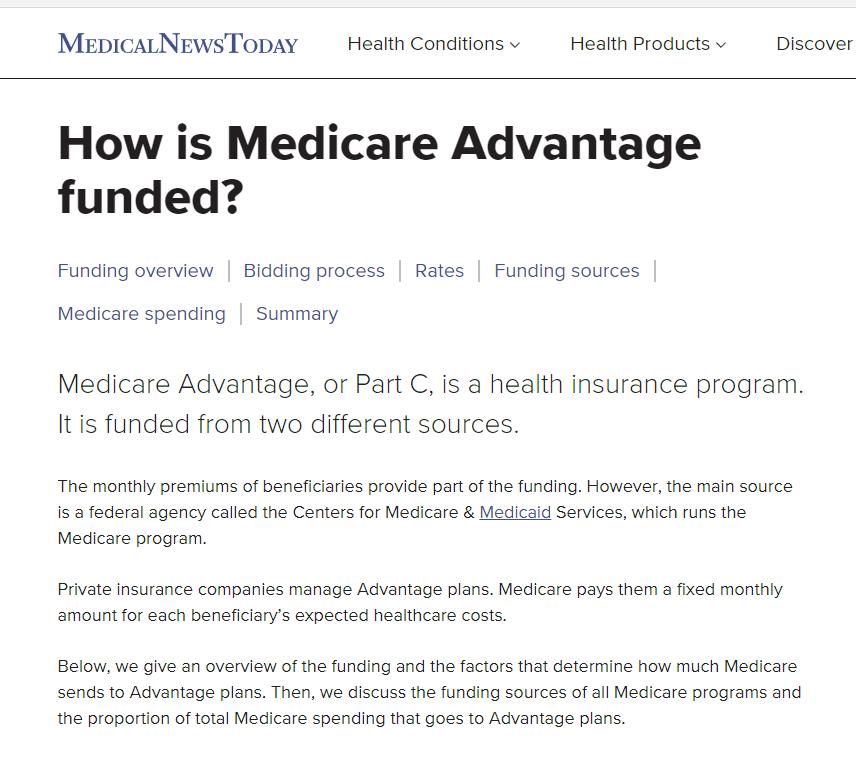While premiums and benefits have improved for beneficiaries, the financial mechanisms behind these plans raise concerns. Medicare Advantage companies, funded by the federal government, are incentivized to manage policyholders’ risks, potentially leading to overspending and profit-driven practices. The push for Advantage plans during open enrollment is linked to commission structures favoring brokers, contributing to a complex system where the government pays significant sums to private insurers. The profitability and potential rip-off aspects of Advantage plans underscore the need for increased scrutiny and consumer awareness in navigating the intricacies of Medicare options. Additionally, the prevalence of Medicare fraud highlights the importance of vigilance and filing complaints for those facing challenges with their insurance coverage.

Most plans NOW are premium free, many have zero copays to pcp’s and 35$ copays to specialists and zero copay Rxs.
How do these ins companies make money?
Medicare Advantage companies have a contract with the federal government. Medicare pays these private companies to take on the risk of its policyholders. So, instead of Medicare paying for your claims, they pay the insurance company to manage them.
….and that equates to BIG money.
Why the mega push from Oct-Dec? *Open Enrollment….(they don’t tell you this but you can change ins carriers ANY time e of year)
According to brokers and agents, the commission structure of Medigap plans incentivizes the sale of plans. Seriously, it’s money. Sorry, that’s the honest truth. The commission for an Advantage plan can be roughly double that of the most popular Medicare supplement plan and it’s paid all at one time.
Who pays for the adverts?
So, these commercials are not from Medicare or the govt. In fact, a large Medicare agency pays ‘Namath’ to advertise Advantage policies that beneficiaries can purchase from their agents. With Advantage plans, Medicare pays carriers to take on the beneficiary’s risk.
Medicares funded through the Hospital Insurance Trust Fund and the Supplementary Medical Insurance Trust Fund.
Who Pays?
The plans receive some funding through monthly plan premiums, but most of the money comes from Medicare. The private insurance companies that offer the plans receive a payment each month from Medicare. This covers the costs of Medicare parts A and B for each beneficiary.
www.medicalnewstoday.com/articles/how-is-medicare-advantage-funded
How much does the US govt pay Medicare Advantage plans?
…..around $12,000
The government pays Medicare Advantage plans a set rate per person, per year (around $12k in 2019, not incl’g Part D–related expenses) under whats called a “risk-based” contract. That means that each plan agrees to assume the full risk of providing all care for that inclusive amount.
Is it profitable?
The Medicare Advantage game is a way some health ins companies make extra money by taking advantage of the rules in the Medicare system. They do this by finding more health issues to report, getting paid more from the govt, and then using those extra payments to offer more attractive insurance plans to seniors.
Are Advantage plans a rip off?
One recent study found that Advantage plans cost the government $106 billion in overspending from 2010 to 2019, and nearly a third of that came in just the last two years. The price tag is predicted to balloon to $600 billion over the next nine years
prospect.org/health/medicare-advantage-is-a-massive-scam/
What is the scandal about Medicare Advantage?
The report estimates that these overpayments cost Medicare $44 to 56 billion annually. Even though beneficiaries enrolled in Medicare Advantage plans tend to be healthier, the private plans systematically make their patients appear sicker to juice more profits out of Medicare.
jacobin.com/2023/10/medicare-advantage-140-billion-scam-senior-health-care#:~:text=The%20report%20estimates%20that%20these,$44%20to%2056%20billion%20annually.&text=Even%20though%20beneficiaries%20enrolled%20in,more%20profits%20out%20of%20Medicare.
What happens if you don’t enroll in Medicare in time?
If you waited 2 full years (24 months) to sign up for Part B and didn’t qualify for a Special Enrollment Period, you’ll have to pay a 20% late enrollment penalty (10% for each full 12-month period that you could have signed up), plus the standard Part B monthly premium ($164.90 in 2023) ($174.70 in 2024).
Late enrollment penalties:
Are added to your monthly premium.
Are not a one-time late fee.
Are usually charged for as long as you have that type of coverage (for most people, that’s a lifetime penalty). The Part A penalty is different.
Goes up the longer you wait to sign up – they’re based on how long you go without coverage similar to Medicare.
www.medicare.gov/basics/costs/medicare-costs/avoid-penalties
Many ins companies & Doctors are getting bagged for Medicare fraud. Many insurance comps are pre authing certain services now. Many ins comps are denying services too.
www.nbcnews.com/health/rejecting-claims-medicare-advantage-rural-hospitals-rcna121012
If your Medicare ins carrier gives you any shit, denying services and or payment, file a CMS complaint against them, and one with your states insurance dept as well.
www.cms.gov/CCIIO/Resources/Fact-Sheets-and-FAQs/appeals06152012a
h/t Phennommennonn
Views: 315